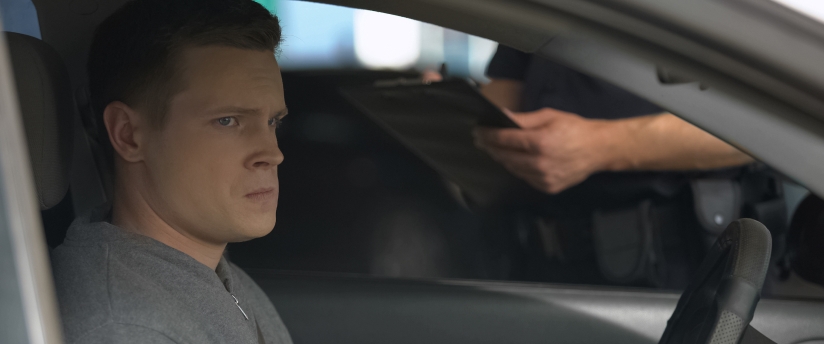What Is Probable Cause for a DWI Traffic Stop?

A police officer must have probable cause to search your vehicle, administer a DWI Field Sobriety Test, or make a DWI arrest. Probable cause means that a reasonable person would believe that a crime has been committed, is being committed, or is about to be committed.
Here are some of the things that can constitute probable cause for a DWI:
- Driving recklessly or erratically
- Smell of alcohol or drugs
- Drugs or alcohol in plain view
- Physical characteristics, such as slurred speech, bloodshot eyes, and difficulty standing or walking
- Hostile or belligerent behavior
- Failing a field sobriety test
- Refusing to take a field sobriety test
What Are the Field Sobriety Tests?
Nationwide, police use the Standardized Field Sobriety Tests developed by the U.S. National Highway Traffic Safety Administration, which involve:
- Horizontal Gaze Nystagmus (HGN) – A police officer asks the driver to follow an object such as a pen with their eyes as they move it back and forth. The officer will observe the driver’s eyes for evidence of involuntary jerking. This test must be administered according to a set of procedures to be considered valid. If the officer failed to follow procedures, the test could be thrown out.
- Walk-and-Turn Test – A police officer asks the driver to walk nine steps, heel-to-toe, along a straight line, turn around, and walk back in the same manner. The officer will look for clues such as starting too soon, stopping while walking, inability to follow instructions, stepping off the line, or using arms to balance. This test must be administered under certain environmental conditions (for example, on a dry and flat surface) and may not be appropriate for all drivers (such as drivers who are older or have certain medical conditions). If the test was administered improperly, it could be determined invalid.
- One Leg Stand – An officer asks the driver to stand on one leg with the opposite foot raised 6 inches above the ground for 30 seconds. The officer will look for clues such as swaying, using arms to balance, hopping, or placing the foot down. This test must also be administered with a certain set of procedures and may not be appropriate for all drivers. If the officer administered the test improperly, it could be thrown out.
What Must the State Prove for a DWI Conviction?
To secure a DWI conviction, the state must be able to prove beyond a reasonable doubt that:
- You were intoxicated.
- You were operating a vehicle.
- You were in a public place.
The prosecutor must provide evidence that supports each of these elements. The burden of proof is on them, not you, to prove your guilt.
Potential Defenses and Alternatives for People Facing DWI Charges in Austin, Texas
The impact of a conviction for DWI can be significant, which is why you need to mount a vigorous defense. An experienced Austin DWI attorney can build a compelling and convincing case on your behalf and seek alternatives for a DWI conviction. Some of the most effective DWI defenses include:
- Improper stop – A police officer cannot pull you over on a whim. They must have “reasonable suspicion” that a crime may have been committed. If your DWI lawyer can show that the officer made an improper stop, any evidence obtained during that stop could be thrown out, destroying the prosecution’s case against you.
- Improper search or seizure – You have a Fourth Amendment right against unreasonable search and seizure. A police officer needs probable cause to search your car or person. If your attorney can show that the officer did not have justification to do so, any evidence they found in a search would be inadmissible in your case.
- Improper arrest – A police officer must have probable cause to perform an arrest. The DWI arrest could be invalidated without clear evidence for probable cause – such as the smell of alcohol, plain view of drugs or alcohol, or failed Field Sobriety Tests.
- Problems with Field Sobriety Test – The Standardized Field Sobriety Tests must be administered according to specific procedures and under certain circumstances. Your DWI lawyer may challenge the tests for several reasons. These include the tests being administered on uneven payment or that a failure was caused by a physical disability rather than alcoholic impairment.
- Problems with breath or blood tests – Breath or blood alcohol tests are not perfect. Your DWI defense lawyer could challenge the results of a breath or blood test for several reasons, such as improper administration or faulty equipment. For example, breathalyzers – the tools used to perform breath tests – must be properly calibrated, or they may return an inaccurate reading.
DWI Probation, Deferred Adjudication, and Expunction or Nondisclosure
If you are convicted of a DWI for the first time, you could be able to pursue certain alternatives to fines or jail time:
- Probation – Individuals on probation (technically, community supervision) are expected to meet certain requirements during their DWI probation period, such as performing community service, abstaining from alcohol or drug use, submitting to random drug tests, undergoing counseling, and meeting regularly with a probation officer.
- Deferred adjudication – Deferred adjudication allows a first-time offender to avoid fines or jail time by completing community supervision. They must also agree to use an ignition interlock system on their car at all times. After the probationary period is complete, the DWI conviction remains deferred. Individuals who complete deferred adjudications are eligible for an Order of Nondisclosure, meaning their DWI arrest and charge are sealed and not disclosed to the public.
It’s important to note that a nondisclosure is not the same as an expunction. A nondisclosure seals your criminal record from the public, including future employers, landlords, and lenders. In other words, you do not have to disclose your arrest to any of these individuals if you receive an Order of Nondisclosure. However, the charge still appears on your criminal record. Law enforcement and other state agencies will still be able to see it. Expunction takes this one step further by erasing the records of the arrest. However, DWI is not eligible for expunction in Texas.
What Happens to Your Driver’s License When Receiving a DWI in Austin, TX?
Suppose you get arrested for a DWI in Austin because you fail or refuse to take a breath or blood test. In that case, your driver’s license will be suspended automatically under a civil administration process called the Administrative License Revocation Program. To appeal this suspension, you must request an Administrative License Revocation hearing within 15 days of receiving notice of the suspension (or 20 days if you underwent a blood test). An attorney can represent you at this hearing and advocate for your rights and interests. While this hearing is unrelated to the criminal case against you, it may provide valuable insight and evidence to your DWI lawyer that can be used to your advantage.
Get Help from Our Austin DWI Defense Lawyers Today
If you were charged with a DWI in Austin, there’s no time to waste for building a strong defense. Contact the experienced DWI defense attorneys at Minton, Bassett, Flores & Carsey, P.C., today for help with your case.







